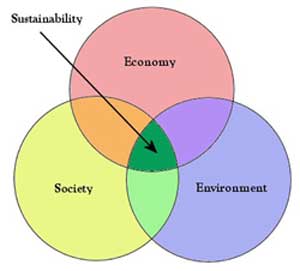Reply To:
Name - Reply Comment
Last Updated : 2024-04-19 00:03:00
 Today, there is no doubt that we are facing an array of profound environmental problems impacting humans, which are already beginning to affect the very foundation of our lives on our planet negatively. Species are becoming extinct at an alarming rate, climate change is quite dramatically impacting us and the Earth’s natural resources are dwindling exponentially.
Today, there is no doubt that we are facing an array of profound environmental problems impacting humans, which are already beginning to affect the very foundation of our lives on our planet negatively. Species are becoming extinct at an alarming rate, climate change is quite dramatically impacting us and the Earth’s natural resources are dwindling exponentially. The debate will rage on as to who is right. Whatever we say or do, nature inevitably has an impact on the environment and will cause major changes to occur, over time, whether we like it or not. The ice age, demise of the dinosaurs, are all examples of how powerful nature is.
The debate will rage on as to who is right. Whatever we say or do, nature inevitably has an impact on the environment and will cause major changes to occur, over time, whether we like it or not. The ice age, demise of the dinosaurs, are all examples of how powerful nature is. Sustainability, both in energy and environment activities, which was the sole custody of the environmentalists, has now encroached into the boardrooms of the corporate world. Today, most big companies embrace some form of sustainable practices, in some form or another, as a part of their social corporate strategy (CSR).
Sustainability, both in energy and environment activities, which was the sole custody of the environmentalists, has now encroached into the boardrooms of the corporate world. Today, most big companies embrace some form of sustainable practices, in some form or another, as a part of their social corporate strategy (CSR). A ‘greener’ business culture can have a very positive effect on employee motivation and moral. People will feel more loyal and proud to work in a company that is making every effort to operate in a cleaner environment, in an honest and progressive manner.
A ‘greener’ business culture can have a very positive effect on employee motivation and moral. People will feel more loyal and proud to work in a company that is making every effort to operate in a cleaner environment, in an honest and progressive manner. This focus on pollution prevention led businesses to examine cleaner production methods. Introduced in 1989 by the United Nations, ‘Cleaner Production’ is the UN term for reducing the environmental impacts from processes, products and services by using better management strategies, methods and tools.
This focus on pollution prevention led businesses to examine cleaner production methods. Introduced in 1989 by the United Nations, ‘Cleaner Production’ is the UN term for reducing the environmental impacts from processes, products and services by using better management strategies, methods and tools.
Add comment
Comments will be edited (grammar, spelling and slang) and authorized at the discretion of Daily Mirror online. The website also has the right not to publish selected comments.
Reply To:
Name - Reply Comment
On March 26, a couple arriving from Thailand was arrested with 88 live animal
According to villagers from Naula-Moragolla out of 105 families 80 can afford
Is the situation in Sri Lanka so grim that locals harbour hope that they coul
A recent post on social media revealed that three purple-faced langurs near t

10 Apr 2024
09 Apr 2024